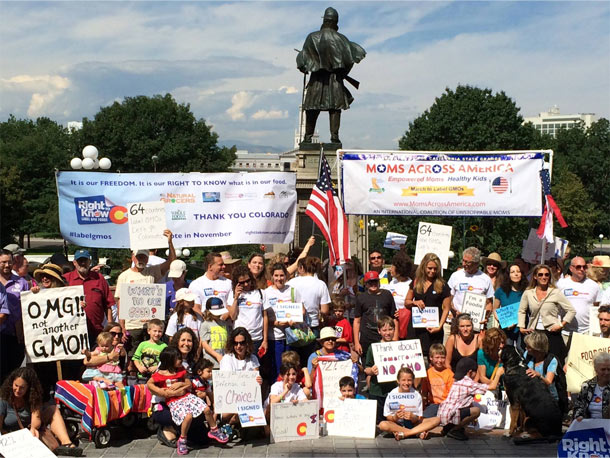Experts say GMO labels needed, not national non-GMO labeling standard
By Ken Roseboro
Published: August 28, 2014
Category: GM Food Labeling and Regulations

To access all the articles in this month's issue of The Organic & Non-GMO Report, SUBSCRIBE NOW.
Food industry lobbying for voluntary GMO and non-GMO labeling diverts attention from real need for mandatory GMO labeling.
Food industry-led legislation that would establish standards for voluntary GMO and non-GMO labeling diverts attention from what consumers want most: mandatory labeling of genetically modified foods.
This was the consensus of several food industry experts surveyed by The Organic & Non-GMO Report.
The legislation, known as the “Safe and Accurate Food Labeling Act” or the “DARK Act” by opponents, was introduced in US Congress in April and aims to preempt state initiatives to label GM foods. It is supported by the Grocery Manufacturers Association, which represents major food companies and retailers, and other farm and food groups that oppose GMO labeling.
National non-GMO standard not needed
“It is backwards to have a national non-GMO labeling standard,” says Dag Falck, organic program manager at Nature’s Path, a manufacturer of organic and Non-GMO Project Verified foods. “It should be a GMO standard: mandatory labeling for products with GMOs.”
Further, Falck says that non-GMO labeling claims are necessary only “when there is not enough protection by government.”
John Fagan, director of Earth Open Source and a noted expert in GMO testing, agrees.
“The big problem is that a voluntary non-GMO standard is diversionary,” he says. “It takes our attention away from the essential goal, which is to require labeling of all products that are genetically modified or that contain GMO ingredients or that are produced using GMO inputs or feed.”
Fagan says the Non-GMO Project meets the need for a national standard.
“A law is not really needed to support non-GMO labeling. The market is making that happen very effectively. The Non-GMO Project standard is a fine standard that is transparent and both meaningful to consumers and doable for producers of products,” he says.
Trudy Bialic, director of public affairs at PCC Markets, the largest natural food co-op in the US, agrees.
“We already have a national standard for labeling non-GMO foods, which is recognized and accepted by shoppers/consumers and industry—the Non-GMO Project,” she says. “If there’s to be any national standard, the Non-GMO Project needs to be it.”
Megan Westgate, executive director of the Non-GMO Project, also emphasizes the need for mandatory GMO labeling.
“In the absence of a national GMO labeling standard, meaningful labeling efforts led by individual states are bringing much-needed transparency and awareness. Labeling gives consumers the right to know what is in the food they buy and feed their families. The DARK Act undermines the extensive progress in mandatory labeling that consumers have made and that the Non-GMO Project supports,” she says.
“Next step in non-GMO communication”
On the other hand, Carl Jorgensen, director, global consumer strategy-wellness at Daymon Worldwide, sees the value of a national non-GMO standard.
“The trend for more transparency cannot be stopped, and a national standard would be the next step in non-GMO communication to consumers,” says Jorgensen, whose company oversees Kroger’s organic and natural foods brand, Simple Truth. “A national standard will remove uncertainty and expense from the market for retailers, manufacturers, and consumers. The same thing was seen when the earlier patchwork of organic standards was replaced by a national standard. Consumer confidence in organic increased.”
Jorgensen thinks a national standard should be based on the Non-GMO Project standard, which he calls a “sufficiently rigorous system.”
However, he warns that a national non-GMO standard could be watered down by special interests.
“It would be remarkable if a national standard could be created so simply, without a lot of political tinkering around the edges!” he says.
Allen Lewis, director of special projects at Vitamin Cottage/Natural Grocers, a Colorado-based natural food retail chain, says a non-GMO standard would help clearly segment the market.
“A mandatory standard is needed to identify organic from conventional (non-GMO) and from GMO. The ingredient supply chain would benefit from this, and each producer could better gauge demand and maximize revenue if products were properly segregated,” he says.
Greg Lickteig, director of the identity preserved grain program at The Scoular Company, also supports a national non-GMO labeling standard.
“The federal government rather than the states should facilitate the labeling of either GMO or non-GMO. We can look to other major world economies for direction such as Korea or Japan that consume large volumes of our agricultural commodities. They provide direction to industry as to when a product can be labeled,” he says.
While supporting the idea of a national non-GMO standard, Michele McRae, senior director research formulation & quality at Rainbow Light Nutritional Systems, also wants to see mandatory GMO labeling.
“Should we just follow the EU (which has mandatory GMO labeling)? People have the right to know if GMOs are in the foods they eat for health and environmental concerns,” she says.
© Copyright The Organic & Non-GMO Report, September 2014




